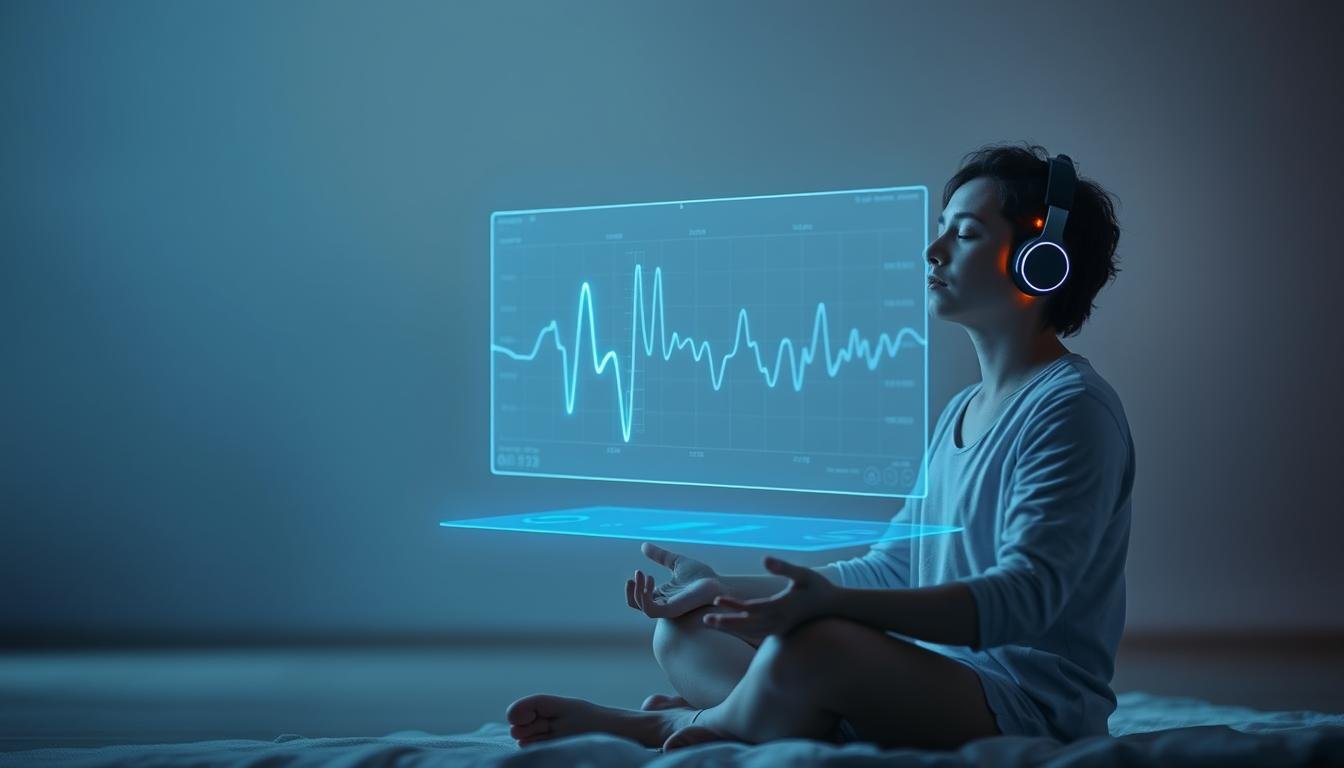Ever noticed some days you feel more alive and your complexion looks radiant? On other days, you might feel tired and your skin appears dull. Your body’s internal clock might be the reason.
Your body’s internal clock controls many functions over a 24-hour cycle. Knowing how it affects your health is important for better health outcomes. We’ll look into how your internal clock impacts your health in this article.
Key Takeaways
- The internal biological clock influences various bodily functions.
- Understanding this influence is crucial for overall health.
- Optimizing your daily routines can improve health outcomes.
- A healthy internal clock is linked to better overall wellbeing.
- Simple lifestyle changes can significantly impact your health.
Understanding Circadian Rhythm and Its Importance
Knowing about the circadian rhythm is key to understanding its impact on sleep, skin, and mental health. It’s like an internal clock that controls our body’s functions. It’s vital for our overall health.
What is Circadian Rhythm?
The circadian rhythm is a natural process in living beings, happening every 24 hours. It’s controlled by brain cells that respond to light and dark. This helps our body functions match the day-night cycle.
Keeping our body functions in sync with the environment is key for good health. When our circadian rhythm is balanced, we sleep better, our skin heals faster, and we feel mentally sharp.
The Science Behind Circadian Rhythm
The science of the circadian rhythm is complex. It involves the brain, hormones, and other body functions. The suprachiasmatic nucleus (SCN) in the brain is the master clock. It controls hormone release, like melatonin and cortisol, which affect our sleep-wake cycle.
How It Affects Sleep and Biological Functions
The circadian rhythm greatly influences our sleep and body functions. At night, melatonin helps us sleep, and cortisol levels drop. In the day, cortisol increases to keep us alert, and melatonin levels go down.
| Time of Day | Melatonin Levels | Cortisol Levels | Biological Function |
|---|---|---|---|
| Night | High | Low | Sleep Promotion |
| Day | Low | High | Alertness and Energy |
Respecting our circadian rhythm can improve sleep, skin health, and overall well-being.
The Connection Between Circadian Rhythm and Skin Health
The circadian rhythm plays a big role in skin health. It controls when skin repairs and regenerates. This internal clock affects many body functions, including keeping the skin healthy.
Why Skin Needs Rest
Skin needs rest to heal from daily stress like UV rays and pollution. At night, it fixes itself by regrowing cells and fixing its barrier.
Here’s why skin needs rest:
- Fixing damage from the environment
- Regrowing skin cells
- Fixing the skin’s barrier
- Making skin more elastic and firm
Key Skin Repair Processes During Sleep
During sleep, the body’s circadian rhythm drives important skin repairs. These include:
- Collagen production: Collagen, which makes skin strong and elastic, is made most during sleep.
- Cell turnover: The process of replacing old skin cells with new ones gets better during rest.
- Moisture retention: The skin holds moisture better, keeping it hydrated and soft.
Knowing these processes helps us see why sleep and a good skincare routine are key.
The Role of Sleep in Mental Wellness
Sleep quality is closely tied to mental wellness. It helps regulate emotions and keep moods stable. Getting enough sleep is key to a healthy mind. Sleep problems can cause mental health issues.
Sleep Stages and Their Impact on Mood
Sleep is not just one state but several. It includes REM and non-REM sleep. Each stage has its own role in our mental health.
- REM Sleep: It’s linked to vivid dreams and is important for emotional processing and memory.
- Non-REM Sleep: It helps with physical recovery and also reduces stress and anxiety.
The cycle between these stages is crucial for mood control. Problems with these cycles can cause mood disorders like depression and anxiety.
The Importance of Consistent Sleep Patterns
Keeping a regular sleep schedule is vital for mental health. Irregular sleep can mess up the body’s internal clock. This can lead to sleep disorders and harm mental health.
“Consistency is key when it comes to sleep. Establishing a regular sleep schedule helps regulate the body’s internal clock and can improve the quality of sleep.”
A regular sleep schedule helps follow the body’s natural rhythm. This improves sleep quality and boosts mental health.
| Sleep Stage | Characteristics | Impact on Mental Health |
|---|---|---|
| REM Sleep | Vivid dreams, increased brain activity | Emotional processing, memory consolidation |
| Non-REM Sleep | Reduced brain activity, restoration | Physical recovery, stress reduction |
By focusing on sleep and keeping a regular schedule, we support our mental health. Adding a sleep cycle skincare routine can also improve overall well-being. It makes sure our skin, the largest organ, gets care during sleep.
How Circadian Rhythm Regulates Hormones
The circadian rhythm is key in controlling hormones that affect our mental and skin health. It influences the release of hormones like cortisol and melatonin. These hormones are important for handling stress and getting good sleep.
Keeping these hormones in balance is vital for our health. If the circadian rhythm is off, it can cause hormonal imbalances. This can harm both our mental and skin health.
Cortisol and Stress Response
Cortisol, known as the “stress hormone,” is released when we’re stressed. It helps our body deal with stress by affecting blood sugar, metabolism, and our immune system. Cortisol levels follow a natural cycle, peaking in the morning and dropping at night.
High cortisol levels over time can cause problems like weight gain, sleep issues, and skin problems like acne. To keep cortisol in check, managing stress through meditation and exercise is helpful.
“Cortisol is a vital hormone, but its levels must be balanced. Chronically elevated cortisol can have detrimental effects on both mental and physical health.”
Melatonin’s Effect on Sleep Quality
Melatonin is made by the pineal gland and helps us relax and sleep. It’s released when it’s dark and stopped by light, linking it to our circadian rhythm. Melatonin levels go up at night to help us sleep and go down in the morning to wake us up.
Healthy melatonin levels are key for good sleep. Things like screen time before bed, irregular sleep, and some meds can mess with melatonin. This can cause sleep problems.
- Stick to a regular sleep schedule to help melatonin production.
- Stay away from screens and bright lights before bed to keep melatonin levels up.
- Have a calming bedtime routine to tell your body it’s time to sleep.
Knowing how the circadian rhythm controls hormones like cortisol and melatonin helps us improve our mental and skin health. This knowledge helps us find better ways to manage stress and sleep.
Skin Healing and the Nighttime Routine
For better skin health, a good nighttime skincare routine is key. It should match the body’s natural rhythms. While we sleep, our skin fixes itself by regenerating cells and making collagen. This keeps our skin looking young and healthy.
Best Practices for Nighttime Skincare
It’s important to have a consistent nighttime skincare routine. Start with cleansing to get rid of dirt and makeup. Then, exfoliate to help skin cells renew themselves. Finally, moisturize to keep your skin hydrated.
Using products with retinol and peptides is also good. They help make more collagen and make your skin more elastic.
Ingredients That Boost Overnight Repair
Some ingredients help your skin repair itself while you sleep. Antioxidants fight off free radicals and reduce stress on your skin. Hyaluronic acid gives your skin a deep drink of water.
- Vitamin C boosts collagen and brightens your skin.
- Niacinamide makes your skin more elastic and reduces redness.
- Glycolic acid helps get rid of old skin cells.
Adding these ingredients to your nighttime skincare can help your skin heal better. This leads to skin that looks healthier and more vibrant.
Daytime Activities That Influence Nighttime Repair
What we do during the day affects how well we sleep at night. It impacts both our mental health and how our skin looks. Keeping a regular sleep cycle is key to staying healthy. Paying attention to our daily activities can help keep this balance.

The Impact of Light Exposure
Being in natural light during the day is very important. Natural light exposure helps our body’s internal clock work right. It tells our brain when to be awake and alert.
This helps us sleep better at night. But, too much artificial light, like from screens, can mess with our sleep. It makes it hard to fall asleep and lowers sleep quality. This affects both our mental health and skin care.
Stress Management Techniques
Managing stress is also key during the day. Too much stress can raise cortisol levels, which messes with sleep repair. Doing things like meditation, deep breathing, or yoga can help lower cortisol and relax us.
Adding these stress-reducing activities to our daily lives can improve sleep. Better sleep means better mental health and skin care. A well-rested body can repair and rejuvenate the skin better.
Circadian Rhythm Disruption and Its Effects
The modern lifestyle often disrupts our natural circadian rhythm. This can harm skin repair and mental health. It’s easy to get out of sync with our natural rhythms in today’s fast world.
Several factors cause this disruption. Knowing these causes is key to reducing their effects.
Common Causes of Disruption
Irregular sleep, screens before bed, and stress are major disruptors. Working late or traveling across time zones also affects our internal clocks.
- Irregular sleep patterns
- Screen time before bed
- Stress and anxiety
- Shift work and travel
These disruptions can harm our health now and in the future.
Long-term Consequences for Skin and Mental Health
Long-term disruption can damage skin repair. This can cause early aging and worsen acne. It also raises the risk of mood disorders, depression, and anxiety.
The link between circadian rhythm skincare and health is growing. By knowing the causes and effects, we can protect our skin and mental health.
Skincare Products Aligned with Circadian Rhythms
Skincare products work better when they match the body’s natural rhythm. Knowing how ingredients act at different times helps improve your skincare. This way, you get the most out of your routine.
Ingredients for Morning vs. Night
Choose skincare products based on the time of day for best results. Antioxidants and SPF are key in the morning to shield your skin from harm. At night, retinol and peptides help repair and renew your skin.
A study in the Journal of Clinical and Aesthetic Dermatology stresses the importance of matching skincare to the body’s natural rhythm. It says the skin’s repair and barrier functions are tied to the circadian clock. So, skincare routines should match the time of day.
“The skin’s natural circadian rhythm influences its repair and regeneration processes, making it essential to adjust skincare routines accordingly.”
Recommendations for 24-hour Skincare Rituals
For a complete 24-hour skincare routine, follow these steps:
- Morning: Start with a gentle cleanser, then apply an antioxidant serum, and finish with SPF moisturizer.
- Night: Double cleanse, use a retinol treatment, and end with a nourishing cream.
| Time of Day | Skincare Product | Benefit |
|---|---|---|
| Morning | Antioxidant Serum | Protects against environmental stressors |
| Morning | Moisturizer with SPF | Prevents UV damage |
| Night | Retinol Treatment | Promotes skin repair and regeneration |
| Night | Nourishing Moisturizer | Hydrates and supports skin health |
Aligning skincare with the body’s natural rhythm boosts its effectiveness.
Mindful Practices for Better Sleep
By adopting mindful practices, people can sleep better and feel mentally well. Mindfulness means being fully present in the moment. This can lower stress and help relax.
Mindfulness and Sleep: Studies show mindfulness can greatly improve sleep. Meditation and deep breathing calm the mind. This makes it easier to fall and stay asleep.
Techniques for Enhancing Sleep Quality
There are several ways to improve sleep:
- Meditation: Regular meditation can reduce stress and anxiety. This makes it easier to fall asleep.
- Deep Breathing Exercises: Deep breathing calms the mind and body. It promotes relaxation.
- Progressive Muscle Relaxation: This technique involves tensing and relaxing muscles. It helps release physical tension.
Sleep experts say, “Adding mindfulness to daily routines can greatly improve sleep and mental health.”
“Mindfulness is the practice of being present in the moment, which can help reduce stress and promote relaxation.” –
The Role of Meditation in Mental Wellness
Meditation is key for mental wellness. It reduces stress and promotes relaxation. Regular meditation improves mental clarity and brings a sense of calm.
| Meditation Technique | Benefits |
|---|---|
| Mindfulness Meditation | Reduces stress, improves mental clarity |
| Loving-Kindness Meditation | Promotes compassion, enhances emotional well-being |
| Transcendental Meditation | Reduces anxiety, promotes relaxation |
Adding mindful practices to daily life can deeply impact sleep and mental wellness. By making mindfulness a habit, people can see these benefits for themselves.
The Influence of Diet on Circadian Rhythm and Skin
A well-balanced diet is key for our circadian rhythm and skin health. What we eat can either help or harm our internal clock. This affects how well our skin repairs itself and our overall health.
Nutrients Essential for Skin Health
Some nutrients are vital for healthy skin. Omega-3 fatty acids in salmon and walnuts reduce inflammation and make skin more elastic. Antioxidants like vitamins C and E protect the skin from damage, helping it repair during sleep.
Zinc and probiotics are also important. Zinc aids in wound healing and immune function. Probiotics keep the gut healthy, which is linked to clear skin and overall health.
Foods That Support Sleep Quality
Eating foods that help us sleep is crucial for a good sleep cycle skincare routine. Foods rich in tryptophan, like turkey and chicken, boost serotonin, helping us relax and sleep. Cherries, a natural melatonin source, and herbal teas like chamomile and lavender also support sleep.
It’s also important to avoid foods that can mess with sleep, like those high in sugar and caffeine. Eating these before bed can upset our natural sleep cycle, harming both sleep and skin health.
Making smart food choices can help our circadian rhythm and circadian rhythm skincare. A balanced diet, regular sleep, and the right skincare can lead to healthier, more resilient skin.
The Importance of Hydration for Skin Repair
Hydration is key for skin repair. Water helps the skin regenerate and heal. It keeps the skin healthy and plump, making it more resistant to damage.
How Water Intake Affects Skin
Water is vital for skin health. It keeps the skin elastic and smooth. When the skin is hydrated, it glows and wrinkles less.
Hydration also helps protect the skin from harm. It acts as a shield against environmental stressors.
Key benefits of hydration for skin include:
- Improved skin elasticity
- Enhanced skin texture
- Better hydration levels support the skin’s natural repair processes during the sleep cycle
Tips for Staying Hydrated Throughout the Day
Staying hydrated is crucial for skin health and overall well-being. Here are some tips:
- Drink at least eight glasses of water a day
- Incorporate hydrating foods into your diet, such as watermelon and cucumbers
- Avoid excessive caffeine and alcohol, which can dehydrate the skin
- Use a humidifier in dry environments to maintain moisture levels
By following these tips, you can help your skin repair itself. This supports a healthy, circadian rhythm skincare routine.
Future Research Directions on Circadian Rhythms
Research on circadian rhythms is growing, revealing new ways to boost skin health and overall well-being. The link between our internal clocks and body functions is fascinating. It’s leading to a focus on using this knowledge to better our health.

The future of studying circadian rhythms is exciting, especially in skincare. Scientists are finding new ways to help skin health through targeted methods. This is thanks to deeper understanding of our internal rhythms.
Emerging Studies on Skincare Technology
New studies are looking into skincare technology that matches our circadian rhythms. For example, timed-release skincare products are being made. They release active ingredients at the best times for maximum effect.
This ensures the skin gets what it needs when it needs it most. It helps with repair during sleep.
“The future of skincare lies in understanding and working with our natural circadian rhythms to optimize skin health.”
The Potential of Personalized Skincare
Personalized skincare is also advancing thanks to circadian rhythm research. It’s possible to create tailored skincare regimens based on an individual’s skin type, lifestyle, and rhythm. This approach can lead to more effective skincare routines.
It not only improves skin health but also boosts overall well-being.
- Customized product formulations based on individual skin profiles
- Timed application schedules to align with the body’s natural rhythms
- Integration with wearable technology to monitor and adjust skincare based on real-time data
As we look ahead, using circadian rhythm principles in skincare and wellness will become more common. By embracing these advancements, people can actively support their skin health and mental well-being. This aligns with their body’s natural rhythms.
Conclusion: Embracing Circadian Rhythms for Holistic Wellness
Understanding our internal circadian rhythm is key for overall wellness. It includes both skin health and mental wellness. By following practices that support our natural rhythm, like regular sleep and mindful activities, we can boost our health.
Practices for Better Skin and Mind
Eating well and staying hydrated are also important. A healthy body can better repair skin cells while we sleep. This leads to a brighter, healthier look.
Creating a Balanced Routine
Having a daily routine that fits our natural rhythm helps our mind and skin. Being aware of light, stress, and sleep quality is crucial. It helps us live a healthier, more balanced life that supports our mental and skin health.



